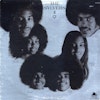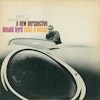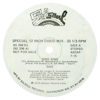Though the nine-member Sylvers family band was patterned after the Jackson 5 and similar groups, the future success of individuals like songwriter Edmund, songwriter/producer Leon, and child singer Foster (the Sylvers’ equivalent of Michael Jackson) suggests they were far more than just an imitation. When Jerry Butler discovered them in the early 1970s, they scored a hit right out the gate with “Fool’s Paradise,” off their 1972 eponymous debut. The Sylvers II didn’t generate the same level of chart success, but in every other way, it was a remarkably superior effort, beautifully layering the Sylvers’ sweet soul vocals onto a bed of dramatic arrangements and funky rhythms.
II shared most of the personnel from its predecessor with a few notable differences. For one, Jerry Peters took over for Butler and joined Keg Johnson as co-producer. Likewise, David Crawford became the group’s full-time horn and string arranger, and deserves much credit for many of the album’s powerfully vibrant songs. Equally important was the addition of drumming legend Harvey Mason as the rhythm arranger, and the last key was engineer/mixer Jim Shifflett, who adroitly met the challenge of combining all these elements together.
The result is one of the best-sounding soul LPs of the 1970s, rivaling anything by similar groups, including the Jackson 5 and the Five Stairsteps. The best tracks, like “We Can Make It If We Try,” “Stay Away from Me,” and “I Remember,” are filled with strong melodic and rhythmic hooks, often times balancing the bright charm of the Sylvers’ voices with darker bass lines and chord progressions. Crawford’s string arrangements, especially important here in giving the songs more heft and depth, recall the lushness of the Philly sound but are still firmly rooted in the raw soul heritage of the Sylvers’ native Memphis traditions.
Worth noting: executive producer Michael Viner found fame himself the same year when his novelty group, the Incredible Bongo Band, released their Bongo Rock. That album, of course, contained a cover of the guitar-rock hit, “Apache,” now the b-boy break of all time.


